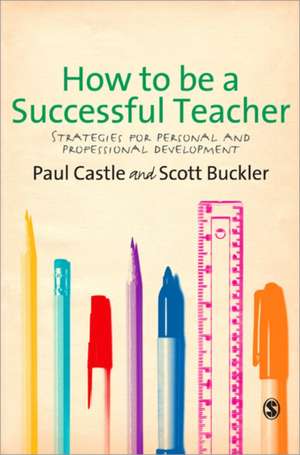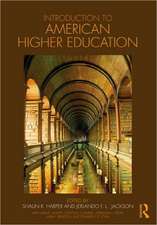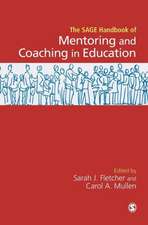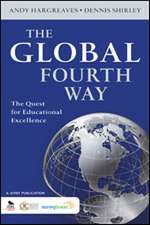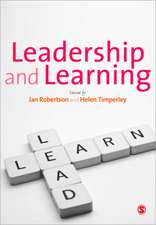How to be a Successful Teacher: Strategies for Personal and Professional Development
Autor Paul Castle, Scott Buckleren Limba Engleză Paperback – 28 oct 2009
-Explorations of physical issues related to successful psychological functioning, such as fitness and nutrition
-Advice and activities which will show you how to learn and use psychological skills and techniques directly
Readily accessible to a wide audience, including internationally, the book assumes no prior knowledge of psychology. The authors give specific examples taken from a diverse range of professional situations, always with relevant theoretical underpinning, and the structure allows you to dip in and out of chapters and sections.
The text provides support to students on teacher training courses at both undergraduate and postgraduate level. It will also help teachers in their formative professional years.
Preț: 422.64 lei
Nou
80.87€ • 84.66$ • 66.92£
Carte tipărită la comandă
Livrare economică 02-08 aprilie
Specificații
ISBN-10: 1849200173
Pagini: 232
Dimensiuni: 156 x 234 x 15 mm
Greutate: 0.36 kg
Ediția:First Edition
Editura: SAGE Publications
Colecția Sage Publications Ltd
Locul publicării:London, United Kingdom
Recenzii
' I picked the book up thinking that I’d better have a look at it as the deadline for submission of my review is looming and… I found myself hooked! Ten minutes later I was still reading for pleasure. I even found myself laughing!' - ESCalate
'It is rare to find a book on teaching that actually provokes thought and stimulates a whole new approach to improving the chances of successful teaching. This book really is a must for anyone within the teaching sector wishing to reach new standards and enjoy greater success in their chosen career...The book is packed with advice, activities and reflections and each chapter concludes with a one minute summary. Overall, this is an excellent book that can really make a difference' - Amazon Customer Review
Cuprins
Acknowledgments
Preface
Foreword
How to use this book
PART ONE: PSYCHOLOGICAL ASPECTS
The morning bell: another day begins! Introduction
What was I saying? Concentration and attention
What am I doing here? Motivation
I can't do it! Confidence and self-esteem
I can't cope! Emotion, mood and stress
Flexibility for action! Adapting to change
PART TWO: PHYSICAL ISSUES
Fitness to Teach: A healthy body equals a healthy mind - Nutrition, hydration and health
PART THREE: PSYCHOLOGICAL SKILLS TRAINING
I have 101 things to do…what do I attempt first? Goal setting
Take a 'break': Relaxation
Is talking to yourself the first sign of 'madness'? Self-talk and cognitive restructuring
Is hallucinating the second sign of 'madness'? Mental imagery
When the going gets tough…! Mental resilience
PART FOUR: EPILOGUE
The final bell… the journey begins
References
Index
Notă biografică
Paul Castle joined the University of Worcester as a senior lecturer in September 2004. He was a Chartered Sport and Exercise Psychologist, Associate Fellow of the British Psychological Society and registered with the Health & Care Professions Council. As an active practitioner, with over 20 years¿ experience, Paul provided applied psychology consultancy to clients in a wide array of disciplines, with a particular emphasis on providing individual- and small-group support to teachers and lecturers, to ameliorate the effects of stress, depression and burnout. As Mental Health and Wellbeing (MHWB or MWB) Lead for the School of Sport & Exercise Science at Worcester, Paul embraced the emerging issue of MWB in students and staff within primary, secondary and tertiary education. He was an advocate for reducing the stigma associated with MWB and provided applied psychological support in guiding students through their own `personal challenges¿ by a combination of sport, physical activity and psychological skills training. Paul was trained in Mental Health First Aid (MHFA) and Applied Suicide Intervention Skills Training (ASIST), in conjunction with his professional grounding. He was an active member of the `Suicide Safer¿ Project Group at the University of Worcester, which aimed to promote `suicide safer communities¿ both regionally and nationally.
